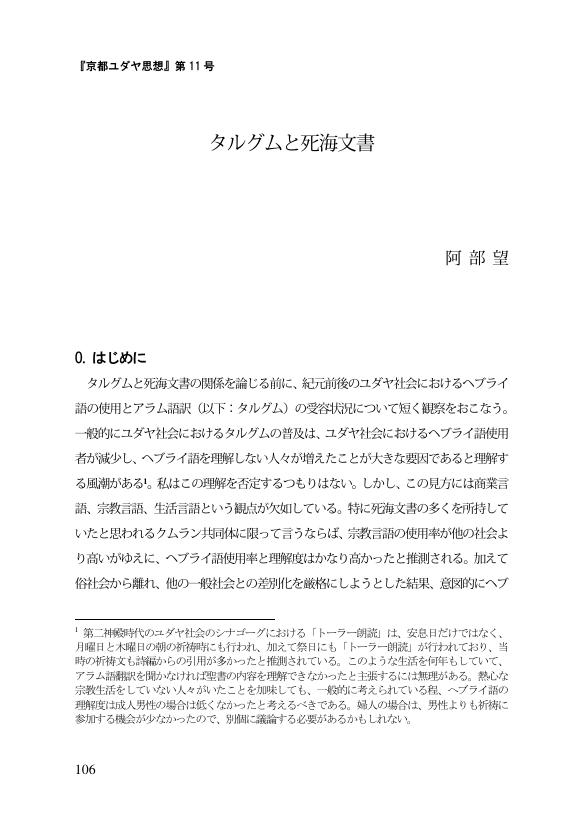1 0 0 0 OA タルグムと死海文書
- 著者
- 阿部 望
- 出版者
- 京都ユダヤ思想学会
- 雑誌
- 京都ユダヤ思想 (ISSN:21862273)
- 巻号頁・発行日
- vol.11, pp.106-121, 2020-12-20 (Released:2023-04-06)
1 0 0 0 OA エマニュエル・レヴィナス「捕囚手帳」の射程 レヴィナスの企て
- 著者
- 渡名喜 庸哲
- 出版者
- 京都ユダヤ思想学会
- 雑誌
- 京都ユダヤ思想 (ISSN:21862273)
- 巻号頁・発行日
- vol.5, pp.43-62, 2015-06-15 (Released:2022-10-24)
Born in 1906 in Lithuania, Emmanuel Levinas became a naturalized citizen of France in 1930. Soon after the World War II started, the philosopher, who followed the French army as interpreter, was arrested by Nazi-Germans and detained in several prisoners' camps. The notebooks, which he wrote through this internment experience, have been published recently as part of the first volume of Works of Emmanuel Levinas. The present article seeks to clarify the potential of these notes, which enables to reexamine the project Levinas had deepened from the beginning of his career to, at least, his magnum opus of 1961, Totality and Infinity.It is discussed firstly that at that period Levinas tried to build his own philosophy of “Jewish being”, by appropriating (sometimes critically) Heidegger's ontology and Rosenzweig's Jewish thought, as well as by turning his attention to some “Hitlerian philosophies”. The influence of literature cannot be omitted for the development of his thought.Among these themes, this article focuses on the plan Levinas has showed in order to explain his own philosophical “system”. According to this plan, his philosophy should propose finally a new concept of “time”, which will appear through the “erotic relation” and the “dialectics of salvation” that consists in rendering “non-definitive” the “definitive” character of the existence of “ego”. From the analysis of the “Notebooks in captivity”, we show that these points of view prepare the very thought Levinas develops after the war and make more comprehensible some enigmatical conceptions treated especially in the final part of Totality and Infinity, such as ambiguity of eros, achievement of the desire, felix culpa, etc.
1 0 0 0 OA 論争としてのハシディズム
- 著者
- 手島 勲矢
- 出版者
- 京都ユダヤ思想学会
- 雑誌
- 京都ユダヤ思想 (ISSN:21862273)
- 巻号頁・発行日
- vol.5, pp.96-103, 2015-06-15 (Released:2022-11-16)
1 0 0 0 OA レヴィナスにおける女性的なもの 性差と主体の二元性
- 著者
- 中 真生
- 出版者
- 京都ユダヤ思想学会
- 雑誌
- 京都ユダヤ思想 (ISSN:21862273)
- 巻号頁・発行日
- vol.4, no.2, pp.S53-S86, 2015-03-31 (Released:2022-11-03)
- 著者
- 朝倉 友海
- 出版者
- 京都ユダヤ思想学会
- 雑誌
- 京都ユダヤ思想 = Journal of Kyoto Association of Jewish Thought (ISSN:21862273)
- 巻号頁・発行日
- no.11, pp.4-26, 2020-07
1 0 0 0 スピノザの名前/事物の思想 : ヘブライ語から見た『エチカ』の言語 (特集号 創立10周年記念・東京大会) -- (記念シンポジウム「いま倫理(エティカ)とはなにか スピノザを考える」)
- 著者
- 手島 勲矢
- 出版者
- 京都ユダヤ思想学会
- 雑誌
- 京都ユダヤ思想 = Journal of Kyoto Association of Jewish Thought (ISSN:21862273)
- 巻号頁・発行日
- no.11, pp.27-52, 2020-07
- 著者
- 國分 功一郎
- 出版者
- 京都ユダヤ思想学会
- 雑誌
- 京都ユダヤ思想 = Journal of Kyoto Association of Jewish Thought (ISSN:21862273)
- 巻号頁・発行日
- no.11, pp.53-63, 2020-07
1 0 0 0 思考のリズム法 : アンリ・メショニックのスピノザ解釈をめぐって (特集号 創立10周年記念・東京大会) -- (記念シンポジウム「いま倫理(エティカ)とはなにか スピノザを考える」)
- 著者
- 合田 正人
- 出版者
- 京都ユダヤ思想学会
- 雑誌
- 京都ユダヤ思想 = Journal of Kyoto Association of Jewish Thought (ISSN:21862273)
- 巻号頁・発行日
- no.11, pp.64-78, 2020-07
- 著者
- 小原 克博
- 出版者
- 京都ユダヤ思想学会
- 雑誌
- 京都ユダヤ思想 (ISSN:21862273)
- 巻号頁・発行日
- no.8, pp.95-101, 2017-06
- 著者
- 平尾 昌宏
- 出版者
- 京都ユダヤ思想学会
- 雑誌
- 京都ユダヤ思想 (ISSN:21862273)
- 巻号頁・発行日
- no.2, pp.56-76, 2012
- 著者
- ハーヴィー ウォレン=ゼエヴ
- 出版者
- 京都ユダヤ思想学会
- 雑誌
- 京都ユダヤ思想 (ISSN:21862273)
- 巻号頁・発行日
- no.5, pp.120-128, 2015-06
- 著者
- 山本 芳久
- 出版者
- 京都ユダヤ思想学会
- 雑誌
- 京都ユダヤ思想 (ISSN:21862273)
- 巻号頁・発行日
- no.5, pp.77-95, 2015-06

